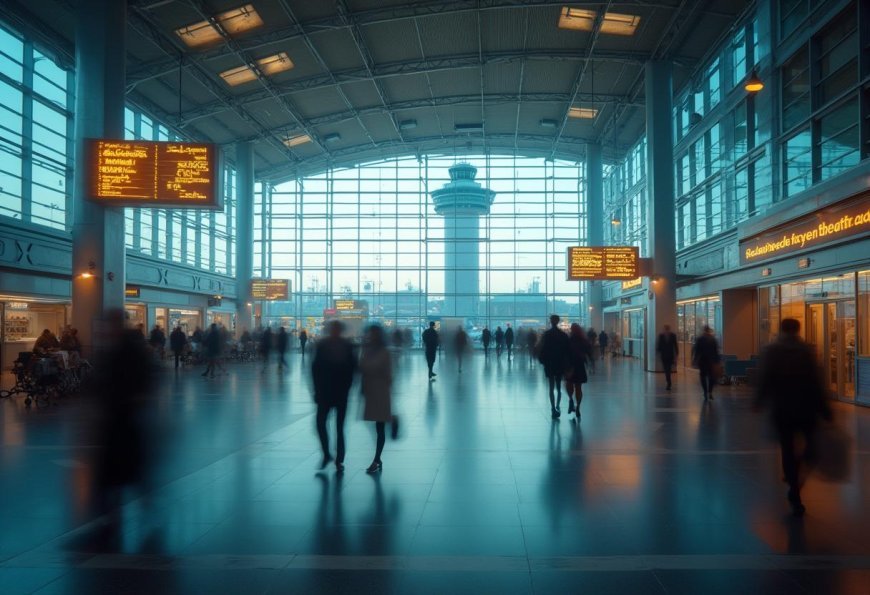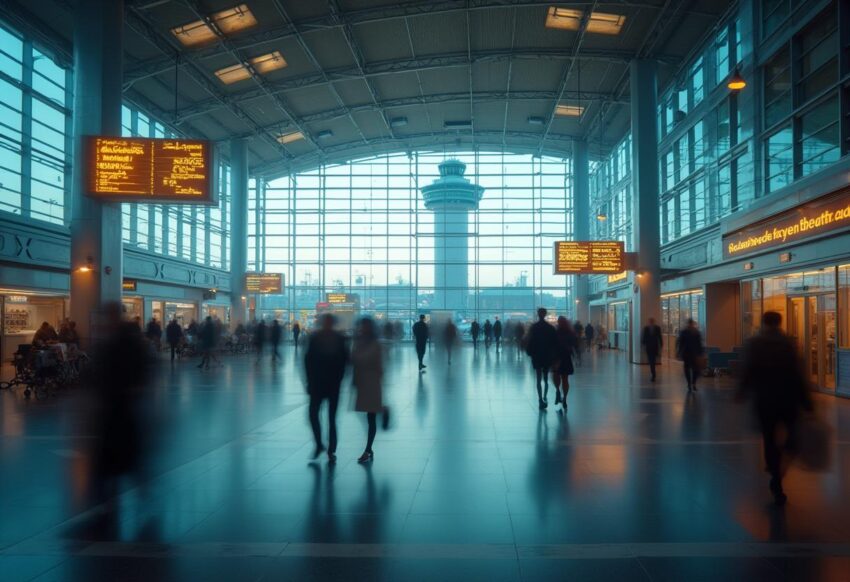Netherlands Faces Major Travel Chaos at Amsterdam Schiphol Airport With Multiple Cancellations, Disrupting Flights for KLM, Emirates, British, American, Iberia, and More


Netherlands’ Schiphol Airport, one of Europe’s busiest travel hubs, experienced major disruptions yesterday. There were 406 flight delays and 28 cancellations, impacting travelers around the world. Passengers flying with airlines like KLM, Emirates, British Airways, American Airlines, and Iberia faced significant delays on both domestic and international flights. The chaos was caused by a mix of weather issues, logistical problems, and the usual operational challenges that airports encounter during busy travel periods.
The disruptions at Amsterdam Schiphol Airport caused significant delays and cancellations, affecting numerous airlines and routes. A total of 406 flight delays were recorded, with 28 cancellations impacting travel to and from various international destinations, including France, the UAE, the UK, the USA, and Spain. Notably, airlines such as KLM, Emirates, British Airways, American Airlines, and Iberia were among the hardest hit, with many flights delayed by several hours. The delays accounted for roughly 6% of all scheduled flights, while cancellations made up around 1% of the airport’s total operations. Both domestic and international flights were affected, making the disruptions widespread and impacting passengers traveling to major cities across Europe, the Middle East, and North America. These disruptions were compounded by logistical challenges, poor weather conditions, and staffing shortages, making travel planning difficult for many passengers.
Key Statistics and Breakdown of Delays and Cancellations
- Total delays at Amsterdam Schiphol: 406
- Delays within, into, or out of the United States: 13
- Total cancellations at Amsterdam Schiphol: 28
These disruptions resulted in longer wait times for passengers and put extra pressure on the airport’s operations. Travelers experienced extended delays due to various factors, including weather conditions and staffing shortages, which contributed to the widespread delays and cancellations.
Delayed Flights by Airline
Delays were widespread across multiple airlines, but KLM, a major carrier at Amsterdam Schiphol, saw the most notable delays. The airline accounted for 181 of the delayed flights, which is about 26% of the total. Other airlines, like easyJet, HOP!, and Air France, were also significantly affected, experiencing noticeable delays in their departures.
KLM: 181 delayed flights (26% of total delays)
easyJet: 31 delayed flights (27% of total delays)
HOP!: 5 delayed flights (20% of total delays)
Air France: 5 delayed flights (20% of total delays)
Cancellations by the Airline
Cancellations played a major role in the disruptions. The following airlines recorded the highest number of cancellations:
KLM: 21 cancellations (3% of total cancellations)
easyJet: 4 cancellations (3% of total cancellations)
Garuda Indonesia: 1 cancellation (100% of its scheduled flights)
Air Arabia Maroc: 5 cancellations (100% of its scheduled flights)
KLM also led in cancellations, which caused further disruptions for international flights from Schiphol. Garuda Indonesia and Air Arabia Maroc were particularly impacted, with all of their flights for the day canceled.
Impact on International Travel Routes
Amsterdam Schiphol is a central hub for both European and international travel. Delays and cancellations affected not just European flights but also international travel. Notably, destinations in the United States experienced 13 delays, highlighting how Schiphol’s issues impacted global air traffic.
U.S.-bound delays: 13 delays affecting travelers to and from Amsterdam Schiphol
Key international cancellations: Flights to and from Jakarta-Soekarno-Hatta, Hong Kong International, and Jomo Kenyatta International in Nairobi were among the most affected.
The disruptions were not limited to European destinations. Travelers from various regions also faced delays in their connecting flights.
Analysis of Cancellations by Airport
Cancellations extended beyond airlines at Amsterdam Schiphol. Other international airports also reported significant cancellations due to the disruptions there. Here’s a snapshot of some of those airports:
London Gatwick (LGW): 33% of flights were canceled, significantly impacting outbound travelers from Schiphol.
Zurich (ZRH): 60% of flights were delayed or canceled, affecting travelers transiting through Schiphol.
Frankfurt International Airport (FRA): About 54% of connecting flights were affected by cancellations from Schiphol, worsening the issue.
The Root Causes of the Disruptions
Several factors led to the disruptions at Amsterdam Schiphol. Although detailed investigations are ongoing, the airport has confirmed that issues such as staffing shortages and severe weather contributed to the delays and cancellations. During busy travel periods, logistical problems worsened the situation, creating further challenges for connecting flights globally.
Navigating Through the Disruption: Tips for Travelers
For passengers traveling through Schiphol during these disruptions, staying informed and proactive is crucial. Here are some tips:
Stay updated: Regularly check flight status through official airline apps or Schiphol’s website for real-time updates on delays and cancellations.
Allow extra time: With delays and cancellations, airports can become busier. It’s essential to allocate extra time for security and rebooking processes.
Rebook immediately: If your flight is canceled, rebook your ticket as soon as possible through your airline’s customer service or online platform.
Schiphol Airport is committed to improving communication with passengers and reducing the impact of future disruptions.
Conclusion: A Glimpse into the Future of Schiphol Airport Operations
Although the delays and cancellations yesterday were significant, Schiphol Airport is focused on addressing the underlying issues. Improvements in infrastructure, staffing, and operational efficiency aim to lessen the frequency and severity of such disruptions in the future. Travelers should stay vigilant and patient as Schiphol continues to navigate peak travel challenges.
While the airport and airlines are taking steps to prevent future disruptions, it remains important for passengers to stay informed and be ready for potential delays. Monitoring official announcements and planning for extra travel time will help ensure a smoother experience, even in the face of challenges.
The post Netherlands Faces Major Travel Chaos at Amsterdam Schiphol Airport With Multiple Cancellations, Disrupting Flights for KLM, Emirates, British, American, Iberia, and More appeared first on Travel And Tour World.






